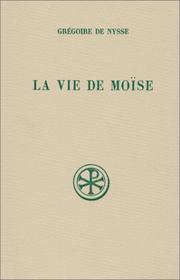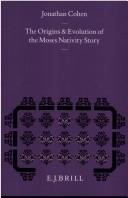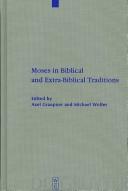| Listing 1 - 10 of 48 | << page >> |
Sort by
|

ISBN: 220406470X Year: 1955 Volume: 1bis Publisher: Paris Editions du Cerf
Abstract | Keywords | Export | Availability | Bookmark
 Loading...
Loading...Choose an application
- Reference Manager
- EndNote
- RefWorks (Direct export to RefWorks)
Moses --- #GGSB: Griekse patrologie (studie) --- #GGSB: Griekse patrologie (tekst) --- Moses (Biblical leader) --- Moïse --- Moiseĭ --- Moisés --- Mosè --- Mosheh --- Mosheh, --- Mosis --- Moyshe, --- Mózes --- Mūsá --- Nabī Mūsá --- משה --- משה, --- Griekse patrologie (studie) --- Griekse patrologie (tekst)
Book
ISBN: 9789004179530 9004179534 9786612951046 9047443837 1282951041 9789047443834 9781282951044 6612951044 Year: 2010 Volume: 10 Publisher: Leiden Boston Brill
Abstract | Keywords | Export | Availability | Bookmark
 Loading...
Loading...Choose an application
- Reference Manager
- EndNote
- RefWorks (Direct export to RefWorks)
The present volume is the result of a team research which gathered biblical scholars, philologists, and historians of religions, on the issue of the multiple 'Interpretations of Moses' inherited from the ancient mediterranean cultures. The concrete outcome of this comparative inquiry is the common translation and commentary of the fragments from the works of the mysterious Artapanus. The comparative perspective suggested here is not so much methodological, or thematic. It is first of all an invitation to cross disciplinary boundaries and to take account of the contributions of diverse cultures to the formation of a single mythology, in the case, a Moses mythology. With respect to Judea, Greece, Egypt or Rome, and further more an emerging christianity and its 'gnostic' counterpart, the figure of Moses is at the heart of a cross-cultural dialogue the pieces of which, if they can be seperated for the confort of their specific study, mostly gain by being put together. Ce volume est le fruit d’un travail d’équipe, qui a réuni des biblistes, des philologues, et des historiens des religions autour des multiples « Interprétations de Moïse » que nous ont léguées les cultures de la Méditerranée antique. Le résultat pratique de cette enquête comparatiste culmine dans la traduction et le commentaire à « douze mains » des fragments du mystérieux Artapan, qui ouvrent le volume. Le comparatisme proposé dans le présent volume ne se veut ni méthodologique ni thématique, mais vise d’abord à franchir les frontières disciplinaires, tout en envisageant les apports culturels respectifs contribuant à la formation d’une mythologie, en l’occurrence celle de Moïse. Entre la Judée, l’Egypte, la Grèce, Rome, et bien-sûr le christianisme naissant et l’univers « gnostique » qui l’accompagne, la figure de Moïse est au cœur d’un dialogue, dont les pièces, si elles peuvent être disjointes pour la commodité de l’étude, gagnent surtout à être rapprochées.
Moses --- Moses, --- Moïse --- Moiseĭ --- Moisés --- Mosè --- Mosheh --- Mosheh, --- Mosis --- Moyshe, --- Mózes --- Mūsá --- Nabī Mūsá --- משה --- משה, --- Moses - (Biblical leader) --- Moïse (personnage biblique) --- Littérature antique --- Dans la littérature --- Thèmes, motifs
Book
ISBN: 2722602687 Year: 2013 Publisher: Collège de France
Abstract | Keywords | Export | Availability | Bookmark
 Loading...
Loading...Choose an application
- Reference Manager
- EndNote
- RefWorks (Direct export to RefWorks)
Developments in literary methodologies and archaeology have led scholars to question the traditional conception of biblical chronology and historiography. The starting point for Maximalist studies is the idea that the biblical story should simply be taken as true. However this position is indefensible from a scientific standpoint. Minimalists consider that everything began either during the Achaemenid period, around 400 years before our own era, or even later during the Hellenistic period. They claim that the Bible is a purely ideological construct and that the first known manuscripts date precisely from this era. However the material cultures and traditions underpinning the Hebrew Bible are often older than the Persian era.

ISSN: 01698834 ISBN: 9004096523 9004378812 9789004096523 Year: 1993 Volume: 58 Publisher: Leiden, The Netherlands : E.J. Brill,
Abstract | Keywords | Export | Availability | Bookmark
 Loading...
Loading...Choose an application
- Reference Manager
- EndNote
- RefWorks (Direct export to RefWorks)
This book traces the development of the Moses nativity story from pre-Biblical sources through its Biblical formulation, and continues to trace its evolution in post-Biblical literature, from the Apocrypha, Pseudepigrapha, and Jewish Hellenistic writings, through Rabbinic literature, and up to Medieval Jewish exegesis. Influence of the Moses nativity story is also detected in Christian writings: hence this book also traces the evolution of the story in the New Testament and early Christian works. This study uses a literary-typological approach, similar to that of the Gunkel-Gressmann school and the method used by Loewenstamm. However, unlike these scholars and their disciples, who focused primarily on the biblical stage, this book gives equal attention to all stages of the evolution of the birth story pattern; and, while providing a detailed analysis of each work, also focuses on continuity, tracing the path along which the literary pattern of the Moses nativity story developed.
Moses (Biblical leader) --- Art --- Moïse (Chef biblique) --- Birth --- Legends --- Naissance --- Légendes --- Moses (Biblical leader) in rabbinical literature. --- 222.2 --- Moses (Biblical leader) in rabbinical literature --- Rabbinical literature --- Genesis --- -Birth --- Moïse (Chef biblique) --- Légendes --- Moses --- Moïse --- Moiseĭ --- Moisés --- Mosè --- Mosheh --- Mosheh, --- Mosis --- Moyshe, --- Mózes --- Mūsá --- Nabī Mūsá --- משה --- משה, --- Birth. --- In rabbinical literature. --- Religion.
Book
ISBN: 290010405X Year: 1976 Publisher: Marsanne Métanoia
Abstract | Keywords | Export | Availability | Bookmark
 Loading...
Loading...Choose an application
- Reference Manager
- EndNote
- RefWorks (Direct export to RefWorks)
Judaïsme --- Juifs --- Christianisme --- Relations --- Christianisme. --- Psychologie. --- Judaïsme. --- Moses --- Judaïsme --- Judaïsme. --- Christianity and other religions --- Jews --- Judaism --- Religions --- Semites --- Psychology --- Relations&delete& --- Christianity --- Religion --- Moïse --- Moiseĭ --- Moisés --- Mosè --- Mosheh --- Mosheh, --- Mosis --- Moyshe, --- Mózes --- Mūsá --- Nabī Mūsá --- משה --- משה, --- Brotherhood Week


ISBN: 9783110194609 3110194600 3110901366 9783110901368 Year: 2012 Volume: Bd. 372 Publisher: Berlin Boston
Abstract | Keywords | Export | Availability | Bookmark
 Loading...
Loading...Choose an application
- Reference Manager
- EndNote
- RefWorks (Direct export to RefWorks)
Im Mittelpunkt der Beiträge des Bandes steht die Wirkungsgeschichte der Person Moses und der mit ihr verbundenen Überlieferungen. Untersucht wird dabei nicht nur die Funktion der Mose-Figur im Pentateuch, das Rettungsgeschehen am Roten Meer und der letzte Tag des Mose, sondern auch die Mose-Rezeption im Deuteronomistischen Geschichtswerk, im Psalter, bei Jeremia, in der Septuaginta, in Qumran, in der außerbiblischen Literatur des frühen Judentums, im Neuen Testament und in der frühen Kirche. The papers in this volume revolve around the history of the influence exerted by the person of Moses and the traditions associated with him. They deal not only with the function of the figure of Moses in the Pentateuch, the salvation in the Red Sea and the final day of Moses’ life, but also with the way Moses was received in the Deuteronomic history, the Psalms, the Book of Jeremiah, the Septuagint, in Qumran, early Jewish extra-biblical literature, the New Testament and the Early Church.
Apocryphal books --- Christian literature, Early --- Apocryphes --- Littérature chrétienne primitive --- Criticism, interpretation, etc. --- History and criticism. --- Critique, interprétation, etc --- Histoire et critique --- Moses --- Bible --- History and criticism --- 222.3 --- Exodus. Leviticus. Numeri --- Littérature chrétienne primitive --- Critique, interprétation, etc --- Moïse --- Moiseĭ --- Moisés --- Mosè --- Mosheh --- Mosheh, --- Mosis --- Moyshe, --- Mózes --- Mūsá --- Nabī Mūsá --- משה --- משה, --- Apocryphal books - Criticism, interpretation, etc. --- Christian literature, Early - History and criticism --- Moses. --- reception. --- tradition.
Book
ISSN: 01679732 ISBN: 9004289453 9789004289451 9789004288430 9004288430 1322872910 Year: 2015 Volume: 159 Publisher: Boston
Abstract | Keywords | Export | Availability | Bookmark
 Loading...
Loading...Choose an application
- Reference Manager
- EndNote
- RefWorks (Direct export to RefWorks)
Scholars have long puzzled over the imagery focused on Moses in 2 Corinthians 3; it is unclear how that imagery fits into the larger context of the letter. Many have explained the imagery as the apostle’s reaction to the “super-apostles,” Jewish missionaries mentioned later in the letter. These preachers, it has been argued, promoted either a θεῖος ἀνήρ or a Judaizing agenda. In Moses in Corinth , Paul B. Duff contends that the Moses imagery has nothing to do with the super-apostles but functions instead as an integral part of Paul’s first apologia sent to Corinth. This apologia , found in 2 Cor 2:14-7:4, represents an independent letter sent to dispel suspicions about the apostle’s honesty, integrity, and poor physical appearance.
Bible. Corinthians, 2nd, III -- Criticism, interpretation, etc. --- Moses (Biblical leader) -- Biblical teaching. --- Religion --- Philosophy & Religion --- Christianity --- Moses --- Biblical teaching. --- Bible. --- Criticism, interpretation, etc. --- Moïse --- Moiseĭ --- Moisés --- Mosè --- Mosheh --- Mosheh, --- Mosis --- Moyshe, --- Mózes --- Mūsá --- Nabī Mūsá --- משה --- משה, --- Biblical teaching --- Bible. N.T. Epîtres. Paul. Corinthiens (anglais) --- 227.1*2 --- 227.1*2 Brieven van Paulus aan de Corinthiërs --- Brieven van Paulus aan de Corinthiërs --- Moses - (Biblical leader) - Biblical teaching --- Moses - (Biblical leader)
Book
ISBN: 9783631631423 3631631421 365302563X Year: 2013 Volume: 13 Publisher: Frankfurt Lang
Abstract | Keywords | Export | Availability | Bookmark
 Loading...
Loading...Choose an application
- Reference Manager
- EndNote
- RefWorks (Direct export to RefWorks)
The political and social changes that occurred with the transformation of the Roman Empire into a Roman Christian Empire and with the bishops' new social position as imperial bishops called for new literary representations of the ideal Christian leader. In this struggle, the figure of Moses turned up as a suitable figure intimately connected with questions of authority and power and, related to this, with the risk of dissension and discord. While the portrait of Moses as a political figure was hardly applicable in Christian discourses of the 2nd and 3rd centuries, it became the centre of interest during the 4th century. This new emphasis was, however, no more new than that it actually revived traditions of 1st-century Jewish biographical and autobiographical narratives.
Greek literature, Hellenistic --- Christian literature, Early --- Littérature grecque hellénistique --- Littérature chrétienne primitive --- Jewish authors --- History and criticism. --- Auteurs juifs --- Histoire et critique --- Moses --- 221-05 --- 27 "03" --- Personen in het Oude Testament --- Kerkgeschiedenis--?"03" --- 221-05 Personen in het Oude Testament --- Littérature grecque hellénistique --- Littérature chrétienne primitive --- Hellenistic Greek literature --- Moïse --- Moiseĭ --- Moisés --- Mosè --- Mosheh --- Mosheh, --- Mosis --- Moyshe, --- Mózes --- Mūsá --- Nabī Mūsá --- משה --- משה,
Book
ISBN: 226800273X 9782268002736 Year: 1984 Publisher: Monaco Ed. du Rocher
Abstract | Keywords | Export | Availability | Bookmark
 Loading...
Loading...Choose an application
- Reference Manager
- EndNote
- RefWorks (Direct export to RefWorks)
Monotheism --- Psychology, Religious --- Moses --- Freud, Sigmund, --- 159.964 --- 296*42 --- Psychology of religion --- Religion --- Religions --- Religious psychology --- Psychology and religion --- God --- Pantheism --- Polytheism --- Theism --- Trinity --- Dieptepsychologie. Psychoanalyse --- Zohar --- Psychological aspects --- Psychology --- Freud, Sigmund --- Moses (Biblical leader) --- 296*42 Zohar --- 159.964 Dieptepsychologie. Psychoanalyse --- Monotheism. --- Psychology, Religious. --- Moïse --- Moiseĭ --- Moisés --- Mosè --- Mosheh --- Mosheh, --- Mosis --- Moyshe, --- Mózes --- Mūsá --- Nabī Mūsá --- משה --- משה, --- Freud, Sigmund, - 1856-1939
Book
ISBN: 9780813231914 0813231914 Year: 2019 Publisher: Washington, D.C. Catholic University of America Press
Abstract | Keywords | Export | Availability | Bookmark
 Loading...
Loading...Choose an application
- Reference Manager
- EndNote
- RefWorks (Direct export to RefWorks)
As it developed an increasingly distinctive character of its own during the first six centuries of the common era, Christianity was constantly forced to reassess and adapt its relationship with the Jewish tradition. The process involved a number of preoccupations and challenges: the status of biblical and parabiblical texts (several of them already debatable in Jewish eyes), the nature and purposes of God, patterns of prayer (both personal and liturgical), ritual practices, ethical norms, the acquisition and exercise of religious authority, and the presentation of a religious "face" to the very different culture that surrounded and in many ways dominated both Christians and Jews. The essays in this volume were developed within that broad field of inquiry, and indeed make their contribution to it. For, among the many issues already mentioned, there was also that of persons. What was Christianity to do, not just with Adam or Noah, say, but with Abraham, David and Solomon, the great prophetic figures of Jewish history-and, of course, with Moses? As we move, chapter by chapter, across the early Christian centuries, we see Moses gradually changing in Christian eyes, and at the hands of Christian exegetes and theologians, until he becomes the philosopher par excellence, the forerunner of Plato, the archetype of the lawgiver, the model shepherd of the people of God-yet all on the basis of a scriptural record that Jews would still have been able to recognize.
Moses --- 291.6 --- 221-05 --- 933.12 --- 933.12 Geschiedenis van het Joodse volk: Mozes en Uittocht; Exodus--(=Laat-brons) --- Geschiedenis van het Joodse volk: Mozes en Uittocht; Exodus--(=Laat-brons) --- 221-05 Personen in het Oude Testament --- Personen in het Oude Testament --- 291.6 Godsdienstwetenschap: religieuze organisatie; religieuze personen --- Godsdienstwetenschap: religieuze organisatie; religieuze personen --- Moïse --- Moiseĭ --- Moisés --- Mosè --- Mosheh --- Mosheh, --- Mosis --- Moyshe, --- Mózes --- Mūsá --- Nabī Mūsá --- משה --- משה,
| Listing 1 - 10 of 48 | << page >> |
Sort by
|

 Search
Search Feedback
Feedback About UniCat
About UniCat  Help
Help News
News